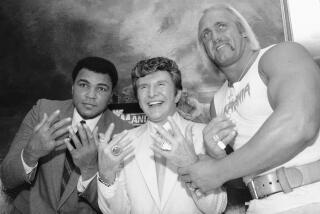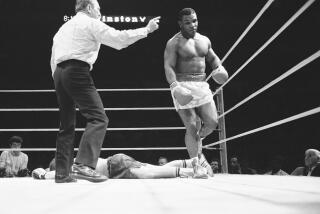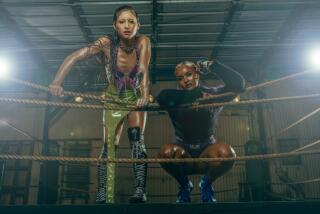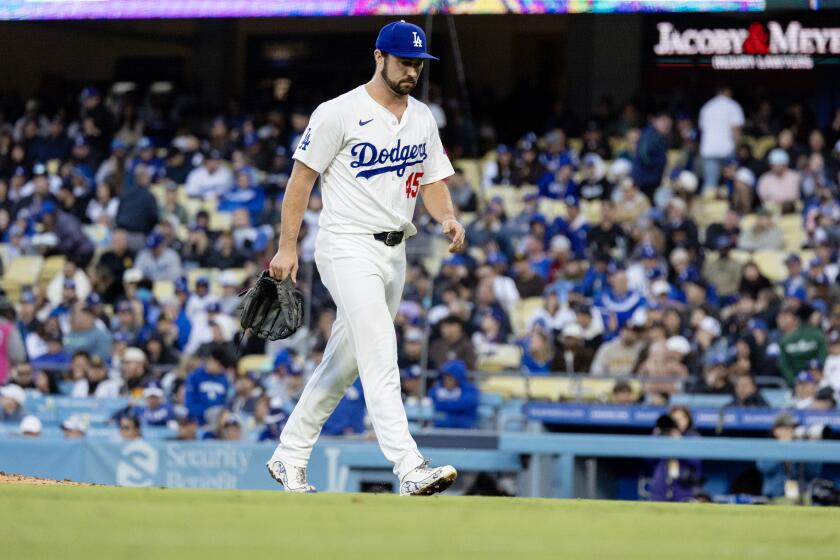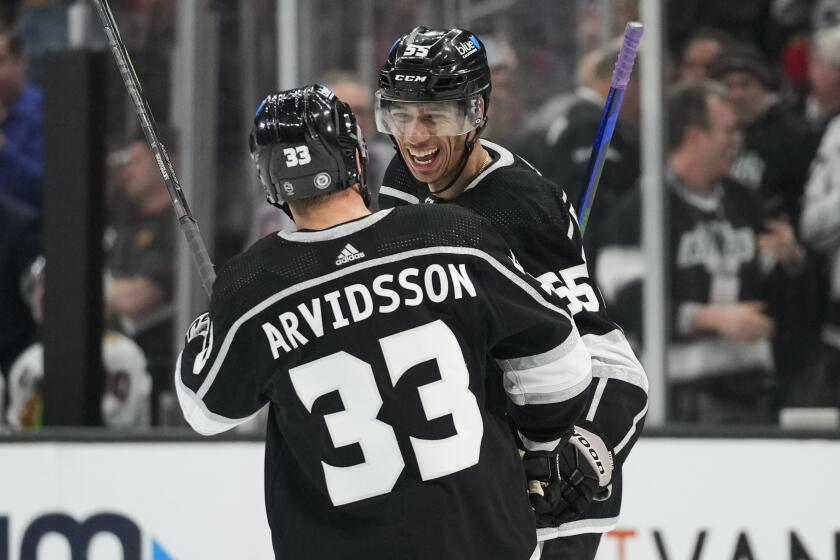Manny Pacquiao, set to face Chris Algieri, still Freddie Roach’s pupil
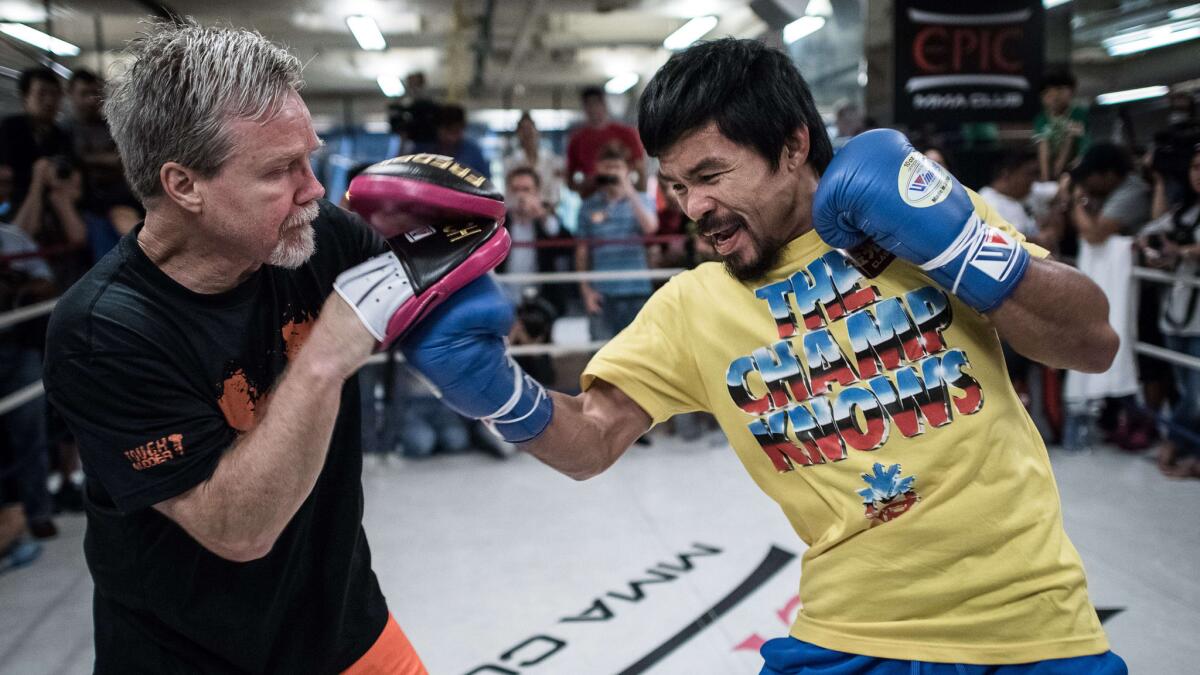
Their partnership is one of the most successful in the history of boxing, a sport not kind to relationships.
Yet Manny Pacquiao doesn’t have Freddie Roach’s phone number.
“And I don’t have his,” Roach said.
Sunday morning in Macao (Saturday night in the U.S.), Pacquiao and Roach will walk toward the ring together for the 30th time. It’s a milestone the 35-year-old Pacquiao intends to mark by knocking out welterweight contender Chris Algieri with lessons the trainer he’s referred to as “master” has taught him.
“The secret is that when we get to our training, I’m not the boss,” said Pacquiao, who as a congressman in the Philippines and a worldwide sports figure usually has the final say.
“You have to accept that’s part of boxing … to stay here [as champion] for long, to improve more, the trainer is the boss. I believe in Freddie, I’ve trusted him from the beginning.”
Roach and Pacquiao first met in 2001, when the young boxer walked into the trainer’s Hollywood gym before his U.S. debut, a super-bantamweight title shot Pacquiao accepted on two weeks’ notice.
With Roach’s help, Pacquiao won that bout in Las Vegas against South Africa’s Lehlo Ledwaba, bloodying the champion’s nose in the first round and scoring three knockdowns before a sixth-round stoppage.
Pacquiao’s vicious fighting style, marked by rapid flurries of punches, was an ideal match for Roach’s offensive approach to the sport.
Their body of work has made Pacquiao (56-5-2, 38 knockouts) boxing’s only eight-division world champion, with victories over Erik Morales, Marco Antonio Barrera, Juan Manuel Marquez, Oscar De La Hoya, Shane Mosley, Miguel Cotto and Timothy Bradley.
Pacquiao promoter Bob Arum, who worked with Muhammad Ali during his famed union with cornerman Angelo Dundee, said Pacquiao-Roach is on a par with Ali-Dundee.
“It’s different, in that Manny still relies on Freddie as a pupil, while Ali in the end relied on Dundee almost as a cheerleader,” Arum said. “That says a lot about Manny, that he realizes Freddie’s knowledge is much greater, and how Manny’s still willing to learn.”
That dynamic was at play during this training camp, which Pacquiao spent near his home in General Santos City, Philippines, with the Algieri bout scheduled relatively nearby in Macao.
Roach spent seven weeks working with Pacquiao, and both men said the lightly interrupted sessions triggered reminders of their early work together without the fighter’s entourage, reporters and other distractions.
“We’re very happy because we felt like those early days,” Pacquiao said. “We did our best to train, focus and bring our best to the ring. It’s all set.”
Roach admits it’s irked him that Pacquiao hasn’t recorded a knockout since stopping Miguel Cotto in the 12th round in November 2009.
So the trainer did some self-analysis and decided to bring back the heavy bag Pacquiao once trained with, ordering him to do the equivalent of five to seven rounds of pounding it each day.
“Once I mentioned it, he said, ‘Yeah, let’s do it again,’” Roach said. “Winning is not enough, you have to be impressive. The heavy bag is strength work. He’s punching well, with more authority, more speed.”
Because of Pacquiao’s body of work, Roach said he’s grown comfortable with listening to what the boxer wants from his training sessions.
Glimpses of how it all started remain, though.
“I can tell, if he does something really good — real good move, a counterpunch — he’ll always look over at me and smile,” Roach said. “We’ll always have that father-son relationship. He wants my approval.”
Since Pacquiao is the one generating the $20-million to $30-million purses, his endorsement of Roach matters too.
Many boxers — including De La Hoya — have had a tendency to find fault with someone else after a defeat, beginning with the trainer.
A few years ago, when Roach’s fighter Amir Khan was knocked out by Danny Garcia, he left Roach for Virgil Hunter. Khan complained that Roach’s work was slipping and noted the trainer’s struggle with Parkinson’s disease symptoms.
But after Pacquiao was knocked out in 2012 by Marquez, in their fourth meeting, someone asked him about Roach.
“His job is to get me ready for the fight, and my job is to win the fight,” Pacquiao answered.
Said Arum: “Manny’s a good judge of character and very loyal.”
Roach said the most he ever worried about his job was while preparing for Pacquiao’s 2009 light-welterweight title bout against Ricky Hatton.
Pacquiao kept late hours playing darts, and the next day a sparring partner living with him reported to Roach’s gym exhausted after the darts tournament.
“I called them all together and [berated] them about the darts,” Roach said. “I told Manny, ‘What are you doing? This is work time. They all follow what you do. So you’ve got to go to … bed!’ Manny didn’t speak to me for a week.”
The scolding seemed to help. Pacquiao was at his destructive best against Hatton, knocking him out in two rounds.
Roach said the delicate task is to balance discipline with admiration, part of the daily grind of pushing for more and sharing the joy of victory.
“We never speak, never see each other, unless we’re in training camp,” Roach said. “He doesn’t call me to say, ‘Happy birthday,’ or ‘How you doin’?’
“We keep our distance. You have to keep that relationship pure. Getting too close to somebody can be the worst thing in the world.”
Twitter: @latimespugmire
More to Read
Get our high school sports newsletter
Prep Rally is devoted to the SoCal high school sports experience, bringing you scores, stories and a behind-the-scenes look at what makes prep sports so popular.
You may occasionally receive promotional content from the Los Angeles Times.
